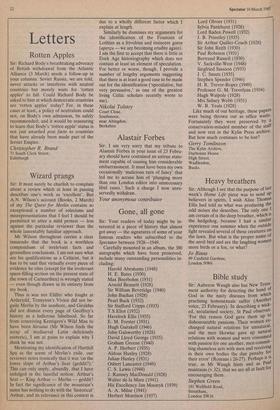Wizard prangs
Sir: It must surely be churlish to complain about a review which at least in passing describes one's work as 'excellent'. But A.N. Wilson's account (Books, 2 March) of my The Quest for Merlin contains so exceptional a number of solecisms and misrepresentations that I feel I should be permitted to utter a mild protest — less against the particular reviewer than the whole lamentably familiar approach.
Mr Wilson throughout carries a cleat innuendo that the book is a worthless compendium of irrelevant facts and groundless conclusions. I am not sure what are his qualifications as a Celticist, but it has to be said that virtually every piece of evidence he cites (except for the irrelevant space-filling section on the present state of the town of Carmarthen) is wrongly stated — even though drawn in its entirety from my book.
Thus is was not Eliffer who fought at Arderydd, Tennyson's Vivien did not be- guile Merlin by the seashore, and Giraldus did not dismiss every page of Geoffrey's history as a ludicrous falsehood. So far from conceiving Kentigern's Wild Man to have been hirsutus (Mr Wilson finds the scrap of mediaeval Latin deliciously esoteric), I am at pains to explain why I think he was not.
Mentioning my identification of Hartfell Spa as the scene of Merlin's exile, our reviewer notes ironically that it was 'on the lower slope of Arthur's Seat (geddit?).' This can only imply, absurdly, that I have indulged in the fanciful notion: Arthur's Seat — King Arthur — Merlin — geddit? In fact the significance of the mountain's name has nothing to do with the 'historical' Arthur, and its relevance in this context is due to a wholly different factor which I explain at length.
Similarly he dismisses my arguments for the identification of the Fountain of Lothian as a frivolous and insincere guess (apergu — we are becoming erudite again).
I am the first to accept that there is little in Dark Age historiography which does not contain at least an element of speculation. For better or worse, though, I provide a number of lengthy arguments suggesting that there is at least a good case to be made out for the identification ('speculative, but very persuasive,' as one of the greatest living Celtic scholars recently wrote to me).
Nikolai Tolstoy
Court Close, Southmoor, near Abingdon, Berkshire


















































 Previous page
Previous page